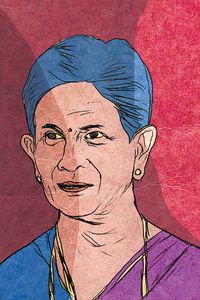Shashi Deshpande is a petite force of nature—spry, sure, sharp and so contained. Ramrod straight and soft-spoken, Shashi exudes an unambiguous no-nonsense attitude that makes it obvious she will not tolerate fools or entertain sycophants. We shared a stage at the recently concluded Times Lit Fest in Bengaluru, along with the intellectually formidable Nayantara Sahgal. Our combined ages that evening worked out to 243 years, with a decade separating me from Shashi, 81, and another separating Shashi from Nayantara, 91. Our given topic—The Originals—was perplexing. And, the brief asked us to question #feminism. Our packed session got off to a lively start, with Shashi admitting she often asked her grandson to help her out with social media trends. But, once both these feisty ladies got talking, there was just no stopping their flow. Both of them have seen more life than most people in the audience. But, here they are looking ahead, not back. There is much to say, and they are doing just that, fearlessly and eloquently.
Both have new books flying off the shelves. Shashi’s is a memoir—Listen to Me—which elaborates her experiences as a writer. I recalled her quote: “There has never been a shortage of males criticising women’s writing.’’ Oh yes, dearest Shashi. Don’t we all know it! I had also read Salman Rushdie’s nasty piece on her, written in retaliation because she had not thought his The Ground Beneath Her Feet worthy enough of an award (she was a jury member). Her memoir lucidly traces her literary path, strewn with multiple recognitions and awards (Padma Shri, Sahitya Akademi award). She talks about her annoyance at being slotted as “a woman writer who wrote about women’’. There are equally telling anecdotes revolving around Shashi having to deal with the usual rubbish of belonging to an “exclusive ladies’ club” filled with “women who wrote in their free time”.
While Shashi did resign from the Akademi to register her protest after the killing of Gauri Lankesh, she, unlike Nayantara, did not return any award or honour. Both writers spoke passionately about their concerns, given the present environment targeting writers, thinkers, poets, artists and filmmakers. While Nayantara is far more forthcoming in her strident criticism, Shashi, in her firm and forceful way, makes her political stand very clear, arguing that there is no area of life that is free of the political, starting with family. However, it is the essential lives of women that preoccupy her as a writer. Shashi’s hero, quite obviously, seems to be her writer father, a prominent Sanskrit scholar. I was privileged to meet her doctor husband in the author’s lounge, and briefly observe their easy camaraderie. Despite a programming glitch that had scheduled Shashi for two parallel sessions, she remained calm and accommodating. Nayantara and I were happy to wait for her to finish the other session and join us. Shashi doesn’t mince words when asked a question. She adjusts her prominent mangalsutra, fiddles with the pallu of her traditional sari, runs her fingers through her short cropped salt-and-pepper hair and says it like it is. Shashi wears her brilliance and position a bit too lightly, methinks.
Nayantara’s latest novella, The Fate of Butterflies, is a hard look at the brutality endured by victims of gang rape. Nayantara lives alone, travels alone, asks for no preferential treatment, and waves away any extra solicitous offers of help with a delicate wave of manicured fingers as she soldiers on. These are lonely battles fought by warriors like the two exceptional women. They do not need to be patronised, certainly not by men or the establishment. They need to be listened to. Shashi and Nayantara, we are listening. Very, very keenly.
www.shobaade.blogspot.com


